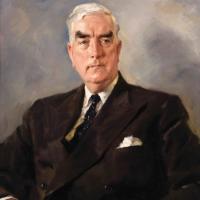The Right Honourable Sir Robert Menzies
05 December 23
Robert Gordon Menzies was initiated into Freemasonry in the Austral Temple Lodge No 110 VC on 10 March 1920. This lodge was later dedicated to the ‘little ships’ which so heroically supported the evacuation of Dunkirk in 1940. The Cinque Ports, of which Menzies was later appointed as Lord Warden, provided many of those ships.
Robert Gordon Menzies was born to James Menzies and Kate (née Samson) in Jeparit, a town in the Wimmera region of northwestern Victoria, on 20 December 1894. He was the fourth of five children, with one sister and three brothers. His father James was a storekeeper and held agencies for farm machinery and as stock agents. James was the son of Scottish crofters who had immigrated to Australia in the mid-1850s in the wake of the Victorian gold rush. His father was elected to the Victorian State Parliament for the seat of Lowan in 1911 and moved with the family to Melbourne after selling the farm.
One of his uncles, Hugh Menzies, had for two years been a member of the Victorian Parliament representing Stawell up to 1904, while another uncle, Sydney Samson, had represented the Division of Wimmera in the House of Representatives. His cousin, Sir Douglas Menzies, became a justice of the High Court of Australia. Robert Gordon (known to many as Bob) was proud of his Highland ancestry – his enduring nickname, Ming, came from the Scots – and his own preferred – pronunciation of Menzies. His middle name, Gordon, was given to him in honour and memory of Charles George Gordon, a British general killed in Khartoum in 1885.
Menzies’ formal education began at Humffray Street State School in Bakery Hill, Ballarat, then later at a private school there. He attended Wesley College in Melbourne and studied law at the University of Melbourne, graduating in 1916.
When World War I began, Menzies was 19 years old and held a commission in the university’s militia unit. He resigned his commission at the very time others of his age and class clamoured to be allowed to enlist. It was later stated that, since the family had made enough of a sacrifice to the war with the enlistment of two of three eligible brothers, Menzies should stay to finish his studies. Subsequently, he was prominent in undergraduate activities and won several academic prizes. He declared himself to be a patriot of Victoria and a supporter of the war and conscription.
Menzies was called to the bar in 1918 and 11 years later he was appointed a King’s Counsel. As a member of the Victorian Legislative Council, he entered politics in 1928 and in the following year, he was elected to the State Legislative Assembly. He served as Deputy Premier from 1932 until 1934.
Successfully contesting the Melbourne seat of Kooyong in the 1934 federal election, Menzies transferred to federal politics representing the United Australia Party (UAP). He was immediately appointed Attorney-General and Minister for Industry in the Lyons government. In 1937 he was appointed a Privy Councillor.
With Lyons’ sudden death on 7 April 1939, Sir Earle Page became caretaker Prime Minister until the UAP could elect a new leader. On 18 April 1939, Menzies was elected leader of the UAP and was sworn in as Prime Minister eight days later. The Second World War started in September and thus Menzies, at the age of 44, found himself a wartime leader. The difficult combination of politics and the war saw Menzies lose vital support and he was forced to resign on 27 August 1941 which subsequently saw the Chifley Labor Government take office.
After a split within the UAP, Menzies formed the Liberal Party in 1944. In coalition with the Country Party, he became Prime Minister for a second term in 1949, defeating Chifley. He then won successive elections up until his retirement in 1966, serving a record term as Prime Minister.
During the next 17 years there was unprecedented expansion of Australian industry, although in 1956 and again in 1961, Menzies applied severe restrictions on the national economy. He was known to some as ‘the great white father’, the protector of traditional values; to others as ‘Ming the Merciless’; and to waterside workers and others as ‘Pig Iron Bob’ for sending scrap metal to Japan.
Sir Robert Menzies was the first Prime Minister to face a TV camera. He was a superb orator and had a great attachment to Britain and the monarchy. He was a great lover and follower of cricket and it was said tongue-in-cheek that he always managed to be in England when a test match was being played!
He retired from Parliament in 1966 and in the following year, he was appointed as Chancellor of the University of Melbourne. He had been created a Knight of the Thistle (KT) in 1963 and appointed a Lord Warden of the Cinque Ports in 1965.
In 1971 Sir Robert suffered a severe stroke and was permanently paralysed on one side of his body for the rest of his life. In March 1977, seated in a wheelchair in the Long Room at the Melbourne Cricket Ground during the Centenary Test, he was dubbed a Knight of the Order of Australia (AK) by Her Majesty the Queen.
Sir Robert died of a heart attack in the study of his home in Malvern, Melbourne on 15 May 1978. Tributes poured in from around the world, including from Her Majesty the Queen. He was accorded a State Funeral at The Scots’ Church, Melbourne; one of the largest ever witnessed in Australia with over 100,000 people lining the streets of the city. Most would agree that he was Australia’s greatest Prime Minister.


(left) Menzies and Queen Elizabeth (right) Robert Menzies with then-treasurer Harold Holt
Sourced from 300 Famous Australian Freemasons with the kind permission of the author Kent Henderson – Originally appeared in the October 2023 edition of the Freemason Magazine.


